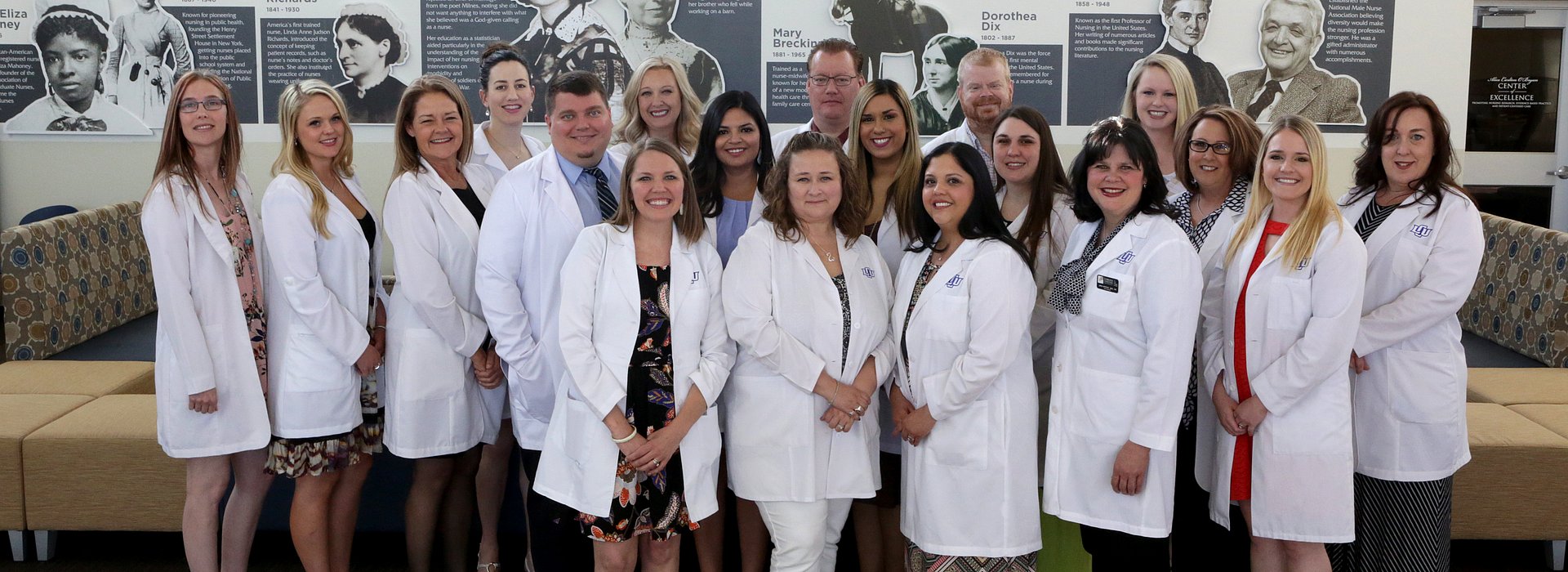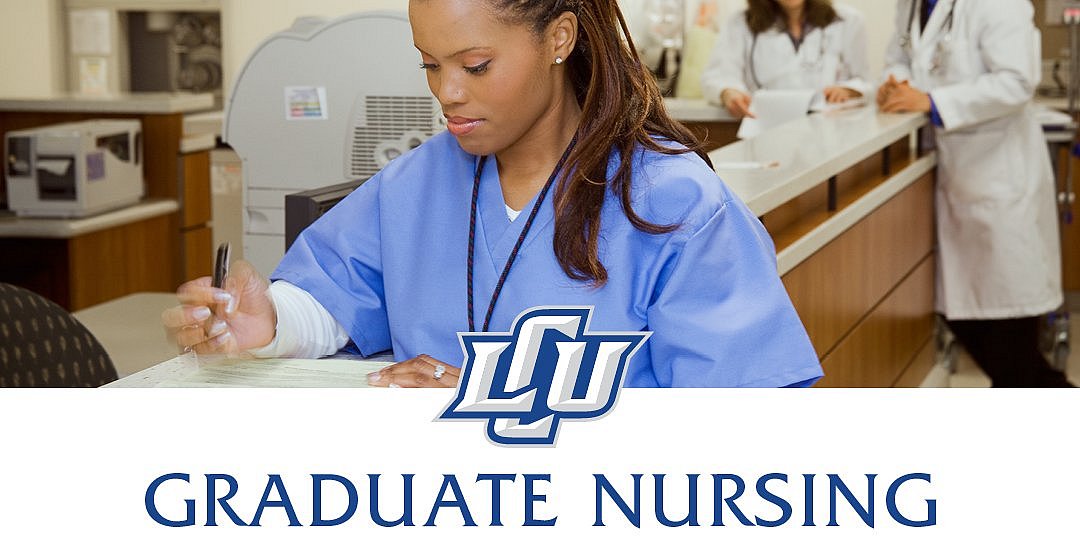
Credit Hours
Length (Years)
Format
Start Date
Request Info
The Lubbock Christian University School of Nursing values its tradition of providing high quality education based on the needs of students and the community. The Family Nurse Practitioner (FNP) Program has been designed to prepare graduates to assume a primary care role in the clinic setting. While this program is considered a hybrid of online and traditional lectures, a substantial amount of time will be physically spent attending lectures, labs, and clinicals. Graduates of the program will receive a Master of Science in Nursing and receive additional education in preparation to sit for the ANCC or AANP board certification exams.
MSN-Family Nurse Practitioner:
- 46 semester hours
- Minimum of 750 hours of clinical training
- Full-time students can complete the program in 2 years and part-time students can complete the program in 3 years
- Designed for students to begin as a cohort each Summer and continue through the curriculum in sequence. A new FNP cohort will begin every May, and a Post-MSN option is now available.

2022
- Success on the licensure and/or certification examination (first time testing): 100%
- Program Completion rates: 100%
- Certification pass rates: 82%
2023
- Success on the licensure and/or certification examination (first time testing): 100%
- Program Completion rates: 100%
- Certification pass rates: 88%
2024
- Success on the licensure and/or certification examination (first time testing): 100%
- Program Completion rates: 100%
- Certification pass rate: 87.5%
Current MSN and FNP programs are accredited by ACEN and SACS.
Application to the Family Nurse Practitioner Track is a two phase process involving the Graduate Studies Office and the Graduate Nursing Department. To start the application process, complete the online student application. Once you have submitted the on-line application, you will be contacted soon with further instructions on when and where to submit the additional information listed below. Applicants must be physically able to perform all patient care skills associated with the role of a family nurse practitioner in the primary care setting. Admission to the MSN / FNP track is anticipated to be highly competitive and will accept a limited number of students annually. New admission applications are open from September 1 through May 1 (see admission criteria).
LCU MSN / FNP Program Admission Criteria
- Bachelor degree from a regionally accredited university (BSN preferred)
- Completed LCU student application
- Minimum GPA of 3.0 (cumulative or last 60 hours)
- 2 years full-time RN work experience
- Current BLS certification
- LCU Credit Agreement
- Faculty Interview (All applicants may not necessarily be granted an interview)
- Submission of personal essay specifying your interest in becoming a family nurse practitioner, your long-term career goals, and why you chose this graduate program. Essay should be double spaced and not exceed 2 pages in length.
- 3 letters of recommendation (1 letter must be from FNP or physician)
- Professional Resume / CV
- Verification of current Texas licensure as RN
- Completion of criminal background check
- $60 (non-refundable) application fee
Summer 1
NUR 5200
Introduction to Graduate Studies
2 hours
NUR 5302
Research and Statistical Methods
3 hours
Fall 1
NUR 5312
Advanced Physiology / Pathophysiology
3 hours
NUR 5101
Advanced Practice Nursing and Forensics: Caring for High Risk Populations
1 hour
Spring 1
NUR 5202
FNP Role, Leadership, and Theory
2 hours
NUR 5314
Advanced Diagnostics and Procedures (60 clinical hours)
3 hours
Summer 2
NUR 5311
Professional Issues: Law and Ethics
3 hours
Fall 2
NUR 5313
Pharmacotherapeutics
3 hours
Spring 2
NUR 5434
Advanced Health Assessment (120 clinical hours)
4 hours
Summer 3
NUR 5338
Advanced Nursing Care: Pediatrics
3 hours
NUR 5440
Primary Care Practicum I (190 clinical hours)
4 hours
Fall 3
NUR 5341
Advanced Nursing Care: Adult / Geriatric
3 hours
NUR 5443
Primary Care Practicum II (190 clinical hours)
4 hours
Spring 3
NUR 5244
Advanced Nursing Care: Women / Prenatal
2 hours
NUR 6200
Evidence-based Project
2 hours
NUR 5445
Primary Care Practicum III (190 clinical hours)
4 hours
Summer 1
NUR 5200
Introduction to Graduate Studies
2 hours
NUR 5302
Research and Statistical Methods
3 hours
NUR 5311
Professional Issues: Law and Ethics
3 hours
Fall 1
NUR 5313
Pharmacotherapeutics
3 hours
NUR 5312
Advanced Physiology / Pathophysiology
3 hours
NUR 5101
Advanced Practice Nursing and Forensics: Caring for High Risk Populations
1 hour
Spring 1
NUR 5202
FNP Role, Leadership, and Theory
2 hours
NUR 5434
Advanced Health Assessment (120 clinical hours)
4 hours
NUR 5314
Advanced Diagnostics and Procedures (60 clinical hours)
3 hours
Summer 2
NUR 5338
Advanced Nursing Care: Pediatrics
3 hours
NUR 5440
Primary Care Practicum I (190 clinical hours)
4 hours
Fall 2
NUR 5341
Advanced Nursing Care: Adult / Geriatric
3 hours
NUR 5443
Primary Care Practicum II (190 clinical hours)
4 hours
Spring 2
NUR 5244
Advanced Nursing Care: Women / Prenatal
2 hours
NUR 6200
Evidence-based Project
2 hours
NUR 5445
Primary Care Practicum III (190 clinical hours)
4 hours
This course will provide an orientation and introduction to graduate level study. A focus on electronic database searching and utilization of community-wide library resources, APA style and introduction to writing for publication, accessing and utilizing technology for online courses, and the professional portfolio will be initiated in the course.
This ocourse will provide the advanced nursing student information and review of common human anatomical structures applicable to clinical pracice. Students must be currently enrolled in the graduate nursing program to enroll in this course.
This course examines the professional history and evolution of the family nurse practitioner. Discussion of legal parameters that govern advanced practice and the role of the nurse practitioner in providing cost-effective care. The fostering of a leadership role in collaborating with multiple stakeholders to improve health safety, accountability, and quality outcomes is emphasized, as well as, evaluation of nursing theories that are the foundation of the APN role.
This course will examine the appropriate use and interpretation of advanced diagnostic tests available to the nurse practitioner in primary care with an emphasis on cost-effectiveness. Various invasive skills common to the primary care setting will be introduced allowing students the ability to develop a basic proficiency.
This course focuses on providing the student with the practical skills to translate practice problems into researchable questions. Examination of quantitative and qualitative research methods, data collection, selection of measurements, and statistical analysis are considered. Students will develop a research proposal from significances to determination of the research plan.
This course examines the professional, ethical, legal, political, and social dimensions of developing an identity as an APRN within the context of nursing practice, institutional, and community environments. Issues of health disparity, cultural diversity, and the health needs of underserved populations are examined. Further areas of consideration will include professional standards and certification, code of ethics, bioethical issues, confidentiality, plagiarism, and liability, regulatory, and collective bargaining considerations.
This course offers an overview of advanced concepts related to normal and abnormal body function. The primary focus is on in-depth and current understanding of disease processes across the lifespan integrating risk factors for disease in various populations.
This course focuses on the clinical application of pharmacology needed in the provision of advanced practice nursing. The emphasis is on drugs commonly used in the family practice and ambulatory primary care setting for the treatment of acute and chronic disease, and on the integration of drug therapy as one component of therapeutic management plans. The application of the principals of pharmacodynamics and pharmacokinetics to clinical use of drugs will be explored, including therapeutic dosage patterns, side effects, drug interactions, and contraindications.
This course provides the student with the ability to expand their knowledge and skills in performing a comprehensive health assessment of patients across the lifespan. An emphasis is placed on utilizing a thorough assessment to distinguish normal and abnormal variants in health, guide health promotion activities, and identify the need for patient-specific disease prevention interventions. During this course the student will be introduced to the use of electronic medical records and begin effectively utilizing electronic data capture during patient encounters.
This course focuses on the appropriate diagnosis, management, and prevention of common acute and chronic illnesses specific to the pediatric population. Human growth and development, holistic, and spiritual concepts will be incorporated.
Application of concepts presented in Advanced Nursing Care with focus on refining health assessment skills, identifying abnormalities in health, interpreting diagnostic findings, improving communication skills, formulating a diagnosis and evidenced-based plan of care, and implementing preventative and health promotion education in culturally diverse populations.
This course focuses on the appropriate diagnosis, management, and prevention of common acute and chronic illnesses specific to the adult and geriatric population. Human growth and development, holistic, and spiritual concepts will be examined.
Application of concepts presented in the Advanced Nursing Care lecture components with focus on refining health assessment skills, identifying abnormalities in health, interpreting diagnostic findings, improving communication skills, formulating a diagnosis and plan of care, and implementing preventative and health promotion education in culturally diverse populations.
This course combines didactic and clinical education that focuses on the health needs of women with additional focus on prenatal care. Emphasis will be placed on refining health assessment skills, patient education, identification of health abnormalities, interpreting diagnostic findings, formulating a plan of care, improving communication skills, and guiding preventative and health promotion activities in culturally diverse populations. Holistic and spiritual concepts of care unique to this population will be examined as well.
Application of concepts presented in the Advanced Nursing Care lecture components with focus on refining health assessment skills, identifying abnormalities in health, interpreting diagnostic findings, improving communication skills, formulating a diagnosis and plan of care, and implementing preventative and health promotion education in culturally diverse populations.
Culmination of program course work occurs in this course in which students participate in a community based field experience reflecting the role of the family nurse practitioner. Pending faculty approval, each student will develop and present an evidence-based project based on the needs of an identified population. This course is the capstone practicum experience for the family nurse practitioner track.
Visit the University Catalog here to view the Nursing degree plan.
Learn more about this program!
